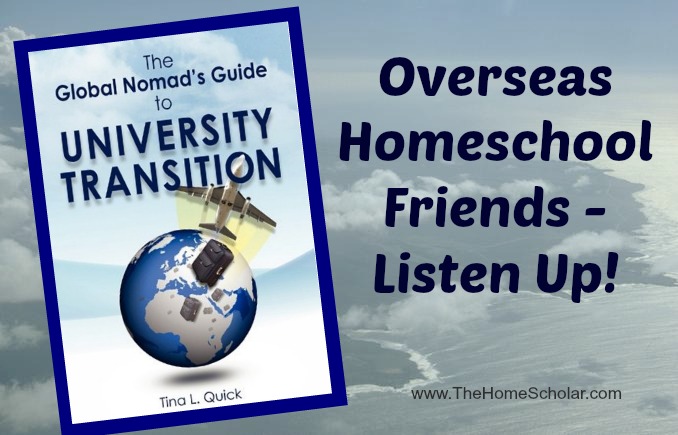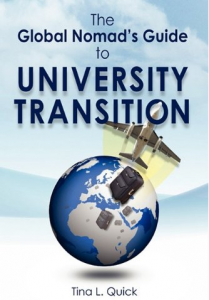Overseas Homeschool Friends - Listen Up!
This post contains affiliate links. If you click and buy I may make a few pennies, but not enough for a latte.
If you are living overseas and are homeschooling because you are military, missionary, or for other reasons live outside the US, I have a great resource for you to add to your home library.
The Global Nomad's Guide to University Transition
One of my overseas homeschool parents suggested this, so I asked to review the book. I think this book will be extremely helpful for homeschooling parents living overseas and plan to have their children live in the US for college or employment.
Here's the deal. Kids who live outside the US feel like US citizens - until they actually COME to the US and suddenly feel like a fish out of water! They sometimes feel like they don't fit anywhere. Their inability to connect with their home country, and separation from their friends in their host country, can make them feel isolated, and even lead to depression.
These issues are seen on a smaller scale with all children attending college. They move away from family and friends, and must dive into a new culture of college, with new expectations and mores. It's just that these issues are so much bigger, with so much more at stake, when your child isn't just moving an hour away, but will be a whole country away - or even a continent away.
This book is a critically important read for parents living overseas. I strongly encourage my overseas homeschool friends to read this as soon as your child starts high school, so you can be working through the issues, and talking about them, before your child goes away to college. You want to support them through their journey into adulthood, and the major transitions involved in a cultural shift.
This book is written for TCKs (Third Culture Kids), ATCKs (Adult Third Culture Kids), and GNs (Global Nomads.) Now, perhaps because I'm not any of those three things, I did find the repeated use of acronyms like this really slowed me down as I was reading the book. Perhaps if I actually was a TCK, I'd be able to skim over that acronym and know exactly what was going on, but even toward the end of the book I had to really slow down to catch the meanings implied with each acronym. But still, if you need this book, I think you really NEED this book.
Pollyanna that I am, I just loved the list of what makes these kids so awesome. They have such huge benefits from living and learning overseas - things that make me so jealous! On page 14 she lists those benefits:
Learning new languages
Meeting new people
Learning first-hand how other cultures operate
Seeing and experiencing many "exotic" places
Having confidence in travel and starting anew
Having friends all over the world
Learning to be creative
Understand there can be more than one way to look at the same thing
Being good storytellers
I just love that list! And it reminds me why these overseas homeschool friends can write such amazing, jaw-dropping, captivating college admission essays! They are always so blasé about their essays, while I'm gushing about the uniqueness. They just don't understand how special they are - in such a wonderful way!
Some tidbits of wisdom I want to share from the book. First, make sure your child is mature when they transition into college or career in a different culture. Second, research your destination and months prior to the start of college. Instead of just learning about "college living" your child will also need to learn a new system of banking, transportation, laundry, etc. Third, may college have groups for Third Culture Kids that will be extremely helpful for students transitioning from overseas - even if it doesn't sound like it will fit your unique situation, it will still be a lifeline.
There is a section about depression that I found very interesting. The book says that at about the third month after moving, many TCK's experience depression - sometimes serious and requiring assistance. That was interesting to me, because I've seen the same sort of transitional difficulty from many students - even those living in the US, and even those who skipped college but live away from home for employment. I can see how those issues can be much more severe if you are separated from your family by a continent.On the other hand, I think it paints a picture of doom and gloom about an issue that may be more common for every incoming student, not just kids from overseas.
Overall, I think The Global Nomad's Guide to University Transition is extremely important for parents living overseas. You can purchase it from Amazon in paperback and Kindle format.

Stay Informed
When you subscribe to the blog, we will send you an e-mail when there are new updates on the site so you wouldn't miss them.

 Login
Login







.jpg)

Comments